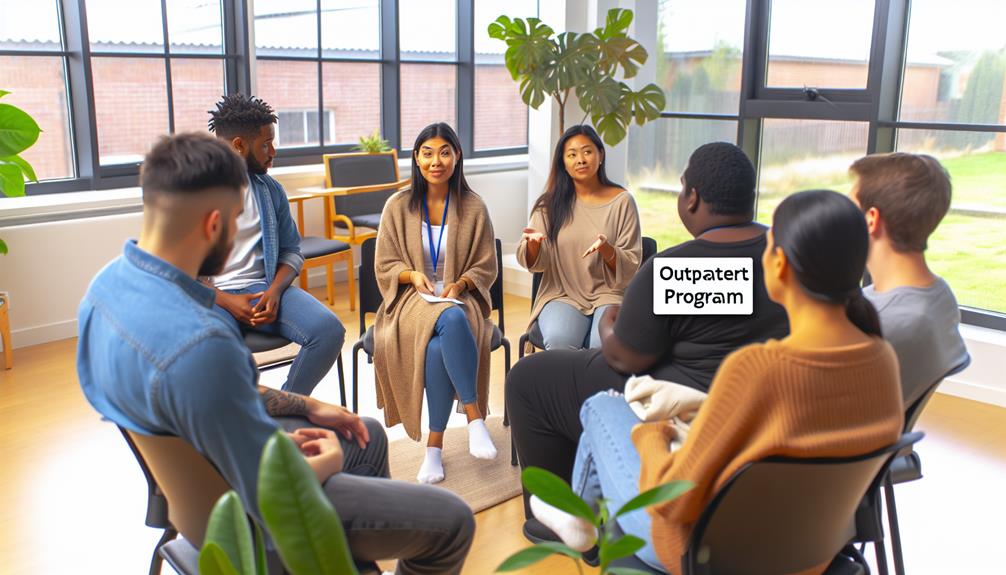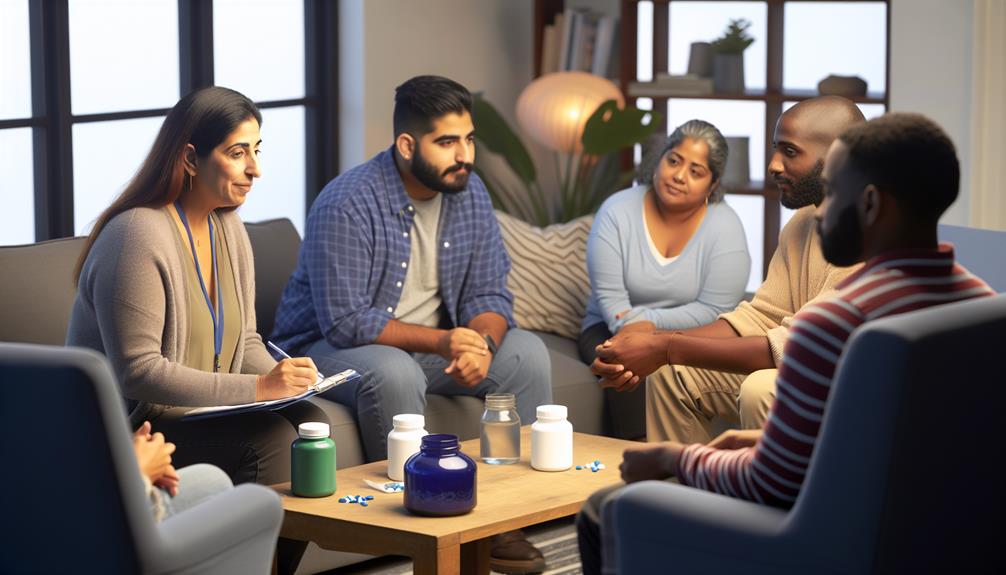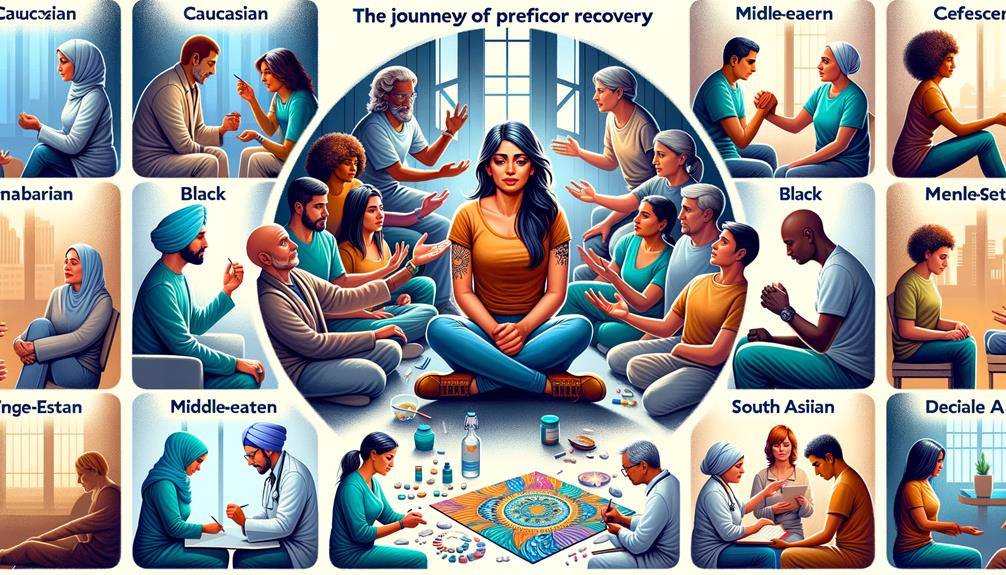You may have heard the saying, 'It's not about the fall, but how you get back up.' When it comes to overcoming prescription drug abuse, the path to recovery is often filled with challenges.
That's why aftercare programs are crucial in providing ongoing support and guidance to individuals who have completed a primary treatment program. But what exactly are these aftercare programs, and how do they contribute to long-term recovery?
In this discussion, we will explore various aftercare options, ranging from outpatient programs to 12-step support groups, that can help individuals maintain their sobriety and build a healthier future.
So, let's dive in and discover the key components of these vital aftercare programs.
Outpatient Aftercare Programs

If you're looking for continued support and guidance after completing a prescription drug abuse treatment program, outpatient aftercare programs offer a flexible and accessible option. These programs are designed to help you transition back into your everyday life while still receiving the support you need to maintain your sobriety.
Outpatient aftercare programs provide a variety of community resources to assist you in your recovery journey. One of the key components of outpatient aftercare programs is their emphasis on relapse prevention. These programs recognize that recovery is a lifelong process and that the risk of relapse is always present. Through individual counseling, group therapy sessions, and educational workshops, you'll learn valuable skills and strategies to identify triggers, cope with cravings, and prevent relapse.
In addition to relapse prevention, outpatient aftercare programs also connect you with various community resources. These resources can range from support groups and 12-step meetings to vocational training and housing assistance. By accessing these resources, you can build a strong support network and address any other challenges you may face during your recovery journey.
Sober Living Homes
Sober living homes provide a supportive and structured environment for individuals in recovery from prescription drug abuse. These transitional housing options offer a valuable opportunity for individuals to continue their recovery journey while being surrounded by a recovery community.
Here are some key aspects of sober living homes:
- Safe and supportive environment: Sober living homes prioritize creating a safe and supportive environment where individuals can focus on their recovery. These homes often have strict rules and regulations that promote sobriety and discourage substance use.
- Accountability and structure: Sober living homes provide a structured living arrangement that helps individuals maintain a daily routine and develop healthy habits. This structure includes regular drug testing, curfews, and mandatory participation in recovery-related activities.
- Peer support: Living in a sober home means being part of a recovery community. Residents support and encourage each other, sharing their experiences, strengths, and hopes. This peer support can be instrumental in maintaining sobriety and building a strong foundation for long-term recovery.
- Transition to independent living: Sober living homes serve as a bridge between residential treatment and independent living. They offer an opportunity for individuals to gradually transition back into society while still having access to support and guidance.
Choosing a sober living home can be a crucial step in the recovery process. It provides a safe and structured environment where individuals can continue their journey towards lasting sobriety, surrounded by a supportive recovery community.
12-Step Support Groups

Step Support Groups offer a crucial source of guidance and camaraderie for individuals in recovery from prescription drug abuse. These groups, such as Narcotics Anonymous (NA) or Pills Anonymous (PA), follow a 12-step program that provides a structured framework for recovery. By actively engaging in these support groups, you can gain valuable insights from others who've faced similar challenges and triumphs.
One of the major benefits of Step Support Groups is their accessibility. In addition to in-person meetings, many groups offer online resources, allowing you to connect with fellow recovering individuals from the comfort of your own home. This can be especially helpful if you live in a remote area or have difficulty attending face-to-face meetings due to scheduling conflicts or other commitments.
Family involvement is another key aspect of Step Support Groups. These groups often encourage family members to attend meetings, where they can learn about addiction, gain a better understanding of your struggles, and provide much-needed support. By involving your loved ones in your recovery journey, you can strengthen your support system and foster healthier relationships.
Cognitive-Behavioral Therapy (CBT)
Cognitive-Behavioral Therapy (CBT) is an evidence-based treatment approach that can greatly assist you in your recovery from prescription drug abuse. It focuses on helping you identify and change negative thought patterns and behaviors that contribute to your substance abuse. In CBT, you'll work with a trained therapist who'll guide you through various techniques to promote cognitive restructuring and coping skills development.
Here are some key elements of CBT that can support your recovery:
- Cognitive restructuring: This involves challenging and reframing negative thoughts and beliefs that may lead to drug abuse. Through therapy, you'll learn to identify triggers, manage cravings, and develop healthier coping strategies.
- Skills development: CBT equips you with practical skills to handle stress, manage emotions, and solve problems without resorting to drug use. You'll learn effective communication, assertiveness, and relaxation techniques to enhance your overall well-being.
- Goal-setting: CBT helps you set realistic and achievable goals for your recovery journey. Your therapist will work with you to create a personalized treatment plan that outlines specific objectives and milestones to measure your progress.
- Relapse prevention: CBT equips you with strategies to prevent relapse and maintain long-term recovery. You'll learn to identify warning signs, develop a relapse prevention plan, and build a strong support network to navigate challenges effectively.
Medication-Assisted Treatment (MAT)

If you're seeking a comprehensive approach to your recovery from prescription drug abuse, Medication-Assisted Treatment (MAT) may be a valuable option to consider. MAT is an evidence-based treatment approach that combines medication with counseling and behavioral therapies to help individuals overcome addiction.
MAT has been proven to be effective in reducing withdrawal symptoms, cravings, and drug use. The medications used in MAT, such as methadone, buprenorphine, and naltrexone, work by blocking the euphoric effects of the drugs, reducing cravings, and minimizing withdrawal symptoms. This allows individuals to focus on their recovery without the constant struggle against physical and psychological cravings.
It is important to note that like any medication, MAT can have side effects. However, the benefits of MAT often outweigh the potential side effects. Common side effects may include nausea, constipation, drowsiness, or insomnia. It's crucial to work closely with a healthcare provider to ensure the medication is properly monitored and adjusted to minimize any side effects.








